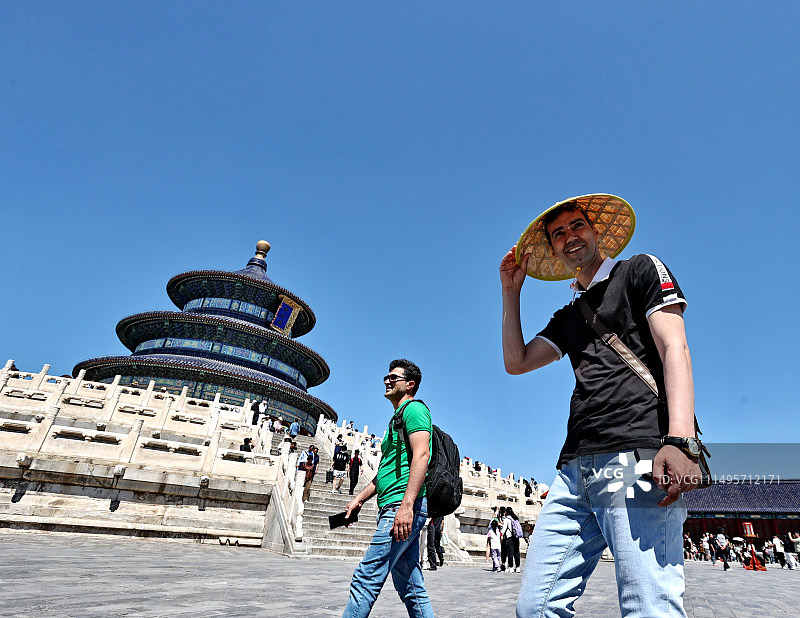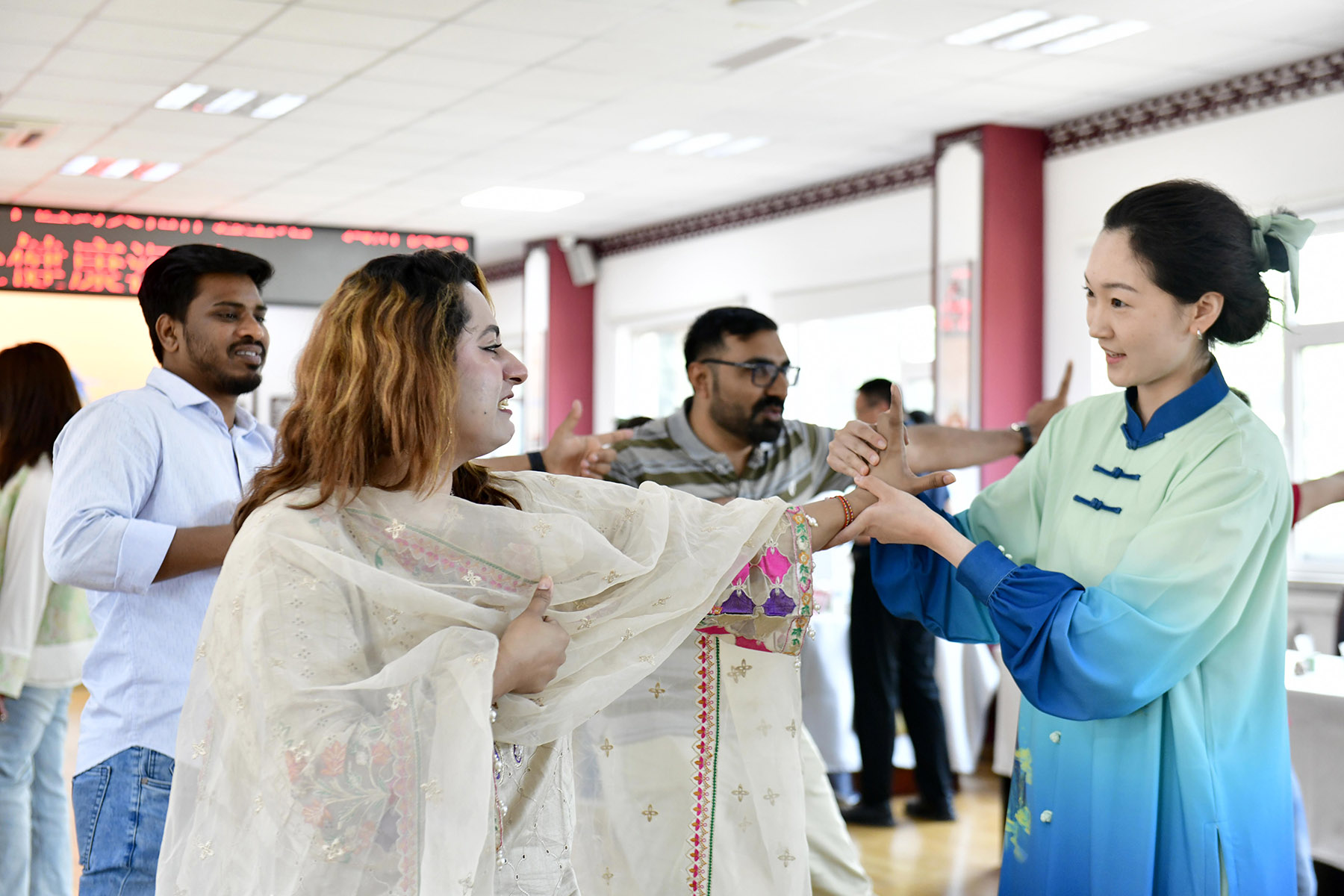Promoting innovation, preserving culture help sector prosper, UN tourism official says

Editor's note: As the People's Republic of China celebrates the 75th anniversary of its founding this year, China Daily asked prominent international figures to reflect on their relationship with the country and to talk of the direction in which they see it going.
For Natalia Bayona, a senior official from the United Nations' specialized agency for tourism, China is impressive for embracing innovation and development while successfully preserving its history and culture.
The executive director of UN Tourism, which was previously known as the United Nations World Tourism Organization, said she has not only been impressed by the virtues of people in China, such as their hospitality and generosity, but also by its development, including the embrace of innovative technologies and the way its tourism industry is planned.
Bayona, from Colombia, has visited China at least 10 times and returned from a cultural event in Quanzhou, Fujian province, in April. She said China's technological advancement is very important for tourism, including the use of artificial intelligence. Innovation has become one of the key pillars of tourism growth, as well as one of the main priorities of UN Tourism, she said.
READ MORE: Visa-free policy helps promote global exchanges
Bayona, 38, was the first person under 40 to reach the position of executive director of UN Tourism in 2023.
In the fields of technology and innovation, Bayona said that UN Tourism — which promotes responsible, sustainable and universally accessible tourism and is headquartered in Madrid — works with more than 10,000 startups from more than 150 countries.
The most important thing is that those startups are focused on AI solutions to solve the challenges in the tourism industry, such as educating people through AI, measuring the capacity of the destinations and allocating tourism resources.
Bayona said that globally, tourism last year ended at 88 percent of pre-pandemic levels.
"The Asian markets are driving good recovery … (with) better connectivity, visa relaxations. And, of course, Asia, and particularly speaking, China, is a strong market for Europe," she said.
In this sense, it is "not only a positive factor but also is part of amazing results that Europe has when it comes to tourism".

Important industry
Tourism has become an important sector of the global economy. According to Bayona, international tourism export revenues were estimated at $1.6 trillion in 2023.
"So I have to say that this is very good and we need to maintain it," she said. "Of course, China's outbound tourism is expected to accelerate the recovery. It is incredible to see that the country is implementing the visa facilitation measures for several markets and destinations so that it will help to boost Chinese domestic and international tourism."
Today, 3 percent of global GDP is linked to tourism and it can help with stability in the world, Bayona said. "As a driver of peace, I hope to help maintain good relations between countries in these difficult situations."
She said that this year is the Chinese Year of the Dragon, and the dragon is a symbol of power as well as generosity and innovation. "And those are key words for tourism," Bayona said. "We need to get stronger in our cooperation with China."
UN Tourism is also promoting tourism education, including through an online academy program, which focuses on Chinese culture, she said.
"We are working on massive online open courses for Chinese people," she said, adding that UN Tourism officials are planning to visit China for topics related to tourism, education and technology with a focus on training local people. Meanwhile, they will keep promoting connections between the private and public sectors to maintain China as a key investor in tourism.
The UN agency will continue to collaborate with Chinese universities like Beijing International Studies University and Peking University to develop joint education programs focused on tourism and technology, Bayona said.
"China is our key player in Asia and we will continue through the existing collaboration with the Ministry of Culture and Tourism," she said.

This year, Bayona will help promote the Global Tourism Economic Forum to connect China with international businesses in the tourism sector. For her, the promotion is crucial to better connect China with the world in order to advance international businesses focused on tourism.
Bayona recalled the first time she visited China when she was working with the Colombian government around the year 2006.
"I remember the thing that I loved most that time about China was how it maximizes traditions through its culture," she said.
She said that Chinese people have values such as welcoming diversity when it comes to cuisine, culture and education. But this does not mean that they will easily lose their traditions.
"For instance, it doesn't matter what kind of restaurants are near you, including international chains. You always have part of your (own cuisine) culture (even) inside of those international brands," she said.
Bayona finds this incredible because, at the end of the day, "you are preserving your history, your tradition and you're adapting international brands to the Chinese culture", which is "smart".
According to her, those main values of the Chinese today are key factors in attracting new tourists who would also like to understand Chinese culture. She hopes tourists to China can promote these unique values to the whole world.
She said she was amazed by the Hong Kong Special Administrative Region when she first visited China. "I love fashion and I am passionate about fashion. Hong Kong is a strong city, where I saw how people believe in fashion and how people through traditions can create new trends."

Frequent visitor
As Bayona has visited China many times, she finds that Hong Kong has been growing quickly over the years, and in fashion, it is "full of new brands" created there.
Seeing how some other Chinese cities have grown to become major cities of technology also impressed her. For instance, Shenzhen in Guangdong province has many top-tech companies, including Tencent, the company behind the instant messaging app WeChat. She recalled being in its headquarters during a visit to China around 2017 when she saw people working on data programming and decided to promote tourism through the application.
Bayona also highlighted how digital payments were launched through the WeChat and Alipay digital platforms, with companies promoting their brands and enabling bill payments. "That's unique … (and) was really impressive."
ALSO READ: Xi stresses efforts to promote high-quality development of tourism sector
Chinese people are conscious about their time and do things efficiently because of the huge population in the country, she said. "That's great because that makes a strong workforce to achieve good results," she said.
"And you can see it in the ways technology has been booming in the country, tourism has been booming in the country, (and) investments and infrastructure have been booming in the country."
Bayona also said that her home country, Colombia, is a good friend of China.
"I think there's a lot of Chinese elements in Colombia and a lot of Chinese investment coming to it," she said.

Natalia Bayona
Executive director of UN Tourism
Career:
2018: Joins the United Nations World Tourism Organization, renamed UN Tourism, and helps launch the Innovation, Education, and Investment Department.
2021: Recognized by the annual Women Leading Travel& Hospitality report as one of the Leading Women in Innovation in the sector.
2022-24: Develops seven startup competitions and six innovation challenges for UN Tourism resulting in more than $74 million in support for entrepreneurs and pilot programs for safe travel.


